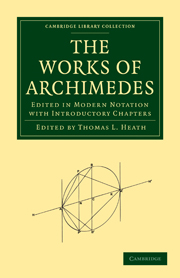Book contents
- Frontmatter
- PREFACE
- LIST OF THE PRINCIPAL WORKS CONSULTED
- Contents
- INTRODUCTION
- CHAPTER I ARCHIMEDES
- CHAPTER II MANUSCRIPTS AND PRINCIPAL EDITIONS—ORDER OF COMPOSITION—DIALECT—LOST WORKS
- CHAPTER III RELATION OF ARCHIMEDES TO HIS PREDECESSORS
- CHAPTER IV ARITHMETIC IN ARCHIMEDES
- CHAPTER V ON THE PROBLEMS KNOWN AS ΝΕΥΣΕΙΣ
- CHAPTER VI CUBIC EQUATIONS
- CHAPTER VII ANTICIPATIONS BY ARCHIMEDES OF THE INTEGRAL CALCULUS
- CHAPTER VIII THE TERMINOLOGY OF ARCHIMEDES
- THE WORKS OF ARCHIMEDES
CHAPTER II - MANUSCRIPTS AND PRINCIPAL EDITIONS—ORDER OF COMPOSITION—DIALECT—LOST WORKS
Published online by Cambridge University Press: 07 September 2010
- Frontmatter
- PREFACE
- LIST OF THE PRINCIPAL WORKS CONSULTED
- Contents
- INTRODUCTION
- CHAPTER I ARCHIMEDES
- CHAPTER II MANUSCRIPTS AND PRINCIPAL EDITIONS—ORDER OF COMPOSITION—DIALECT—LOST WORKS
- CHAPTER III RELATION OF ARCHIMEDES TO HIS PREDECESSORS
- CHAPTER IV ARITHMETIC IN ARCHIMEDES
- CHAPTER V ON THE PROBLEMS KNOWN AS ΝΕΥΣΕΙΣ
- CHAPTER VI CUBIC EQUATIONS
- CHAPTER VII ANTICIPATIONS BY ARCHIMEDES OF THE INTEGRAL CALCULUS
- CHAPTER VIII THE TERMINOLOGY OF ARCHIMEDES
- THE WORKS OF ARCHIMEDES
Summary
The sources of the text and versions are very fully described by Heiberg in the Prolegomena to Vol. m. of his edition of Archimedes, where the editor supplements and to some extent amends what he had previously written on the same subject in his dissertation entitled Quaestiones Arckimedeae (1879). It will therefore suffice here to state briefly the main points of the discussion.
The MSS. of the best class all had a common origin in a MS. which, so far as is known, is no longer extant. It is described in one of the copies made from it (to be mentioned later and dating from some time between A.D. 1499 and 1531) as ‘most ancient’ (παλαιοτάτου), and all the evidence goes to show that it was written as early as the 9th or 10th century. At one time it was in the possession of George Valla, who taught at Venice between the years 1486 and 1499; and many important inferences with regard to its readings can be drawn from some translations of parts of Archimedes and Eutocius made by Valla himself and published in his book entitled de expetendis et fugiendis rebus (Venice, 1501). It appears to have been carefully copied from an original belonging to some one well versed in mathematics, and it contained figures drawn for the most part with great care and accuracy, but there was considerable confusion between the letters in the figures and those in the text. This MS., after the death of Valla in 1499, became the property of Albertus Pius Carpensis (Alberto Pio, prince of Carpi).
- Type
- Chapter
- Information
- The Works of ArchimedesEdited in Modern Notation with Introductory Chapters, pp. xxiii - xxxviiiPublisher: Cambridge University PressPrint publication year: 2009First published in: 1897



